A clash of two teams with different goals was on full display in the Premier League on New Year’s Day. Each also had their own shocking recent result heading into 2019. Tottenham severely hurt their title chances losing to Wolves 3-1. Meanwhile Cardiff City pulled out a stunning result at Leicester, despite having only 38% possession.
Mauricio Pochettino has his stamp on the Tottenham squad this year by employing a medium block press and controlling possession in the middle third of the field. However, there has been a bit of a shift from last year when it comes to pressing. As you can see below, they have allowed a little more possession a little higher up the field.
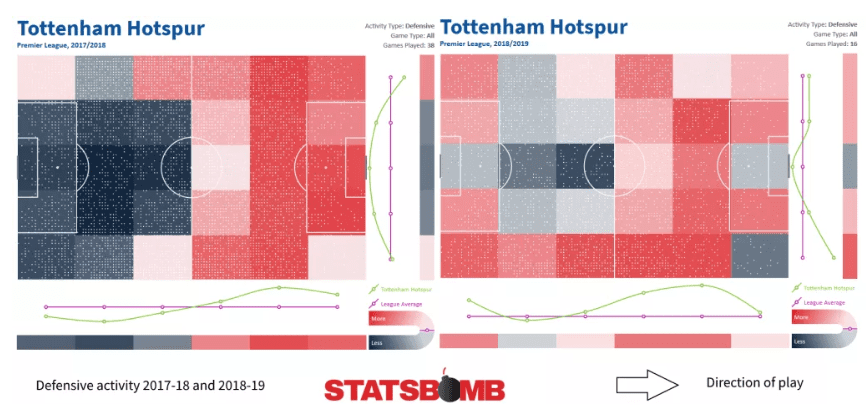
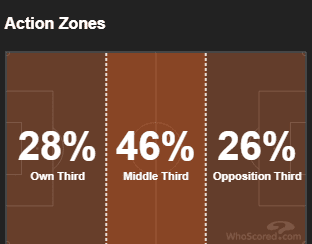
This shift in pressing may mean fewer interceptions and turnovers in the attacking third, but it has allowed for more balanced defensive midfield pressure. This pressure has also allowed for more possession in the middle third of the field of Pochettino’s side. The majority of possession and passes for Spurs this season tend to come from the middle of the pitch.
Neil Warnock’s Cardiff City side have employed the tactics this season that made them successful in the Championship. Defensively they are noted for being disciplined and tough to break down. Going forward, they have stuck with their Championship style in being direct, while lacking possession.
This has not been an extremely smooth transition to the Premier League as they have been broken down by top teams such as Chelsea. However, at home they should have provided some challenges for Pochettino’s side even if they weren’t purposeful in possession. If Warnock’s team could have taken a lesson from Wolverhampton’s third goal against Tottenham, it was to try and catch the gaps in Tottenham’s defence.
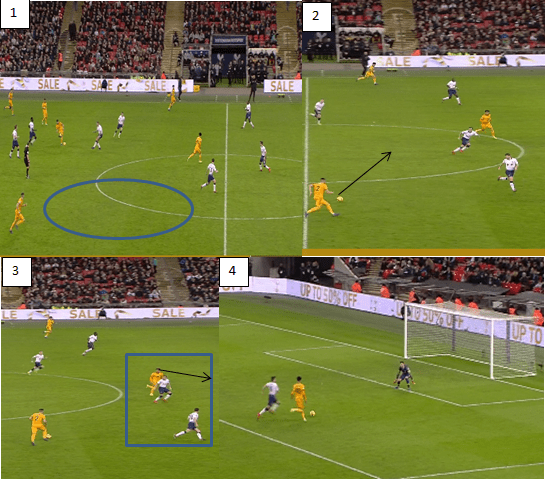
One may consider this match-up a new approach by Pochettino vs the old-school approach of Warnock. In this tactical analysis we are going to focus on Tottenham’s ability to control possession and break down a unique approach by Cardiff City. Cardiff were looking to build off the momentum from their result at Leicester, and having won four out of their last six home matches. On the other hand, Tottenham were trying to get back to the form they were enjoying before their late collapse at Wolves.
Game summary
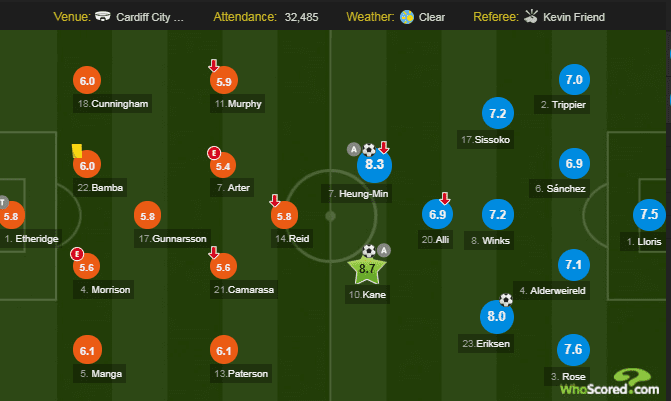
The first half, and even the game, can be defined in the first 30 minutes for Cardiff City. Cardiff came out in a 4-1-4-1, while Tottenham came out in a 4-1-2-1-2. From the beginning of the game Cardiff looked to be out of sorts with Tottenham’s off-the-ball movement. Despite conceding early, Cardiff’s attacking game plan was being run successfully despite its obvious limitations.
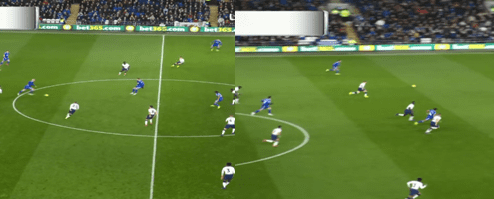
Pochettino’s setup allowed for his creative players to get in the attacking third, essentially forming a 4-2-3-1 when Eriksen pushed forward. His setup calls for his formation to be extremely fluid in attack, especially in the centre.
Spurs were able to break down Cardiff’s low block with relative ease, through crafty combination play and decisive off-the-ball movement. Tottenham continued to dominate the midfield throughout the half and did not have to worry about much defensively, other than a couple half-chances from Cardiff. All three goals came from strong combination play, stemming from the midfield and leaving Cardiff chasing shadows.
Despite being down 3-0 at halftime, Warnock’s tactics did not change from the first half and were only able to apply limited pressure. It was obvious in their lesson against Wolves that Spurs were able to become organised without dropping pressure. Spurs continued to dominate possession and as shown below were very effective in switching the point of attack.
At times it looked like a training session with Spurs moving the ball with relative ease. The only real shift by Warnock in the second half was when his team began pressuring about 10 yards higher up the field. As you can see below, the first and second halves held very similar defensive issues for Cardiff.

Themes
Warnock’s passive pressing setup
Neil Warnock’s side was set up in a 4-1-4-1 and essentially invited Tottenham’s pressure by sitting in a low block. The hope behind this was to limit space for Spurs’ playmakers to find areas of vulnerability, which wasn’t too effective. As you can see below Spurs were able to complete 17 attacking dribbles with 11 being in Cardiff’s half. They only allowed 10 from Cardiff, with six in their own half.
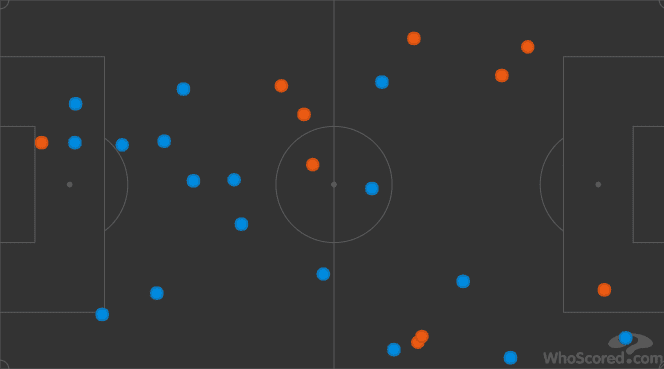
Warnock tactics were aiming at absorbing pressure and attacking on the counter. The issue he ran into is that his team were only able to make nine interceptions and dispossess Spurs 23 times sitting in a low block. In the first half this lead to a couple half chances but Cardiff could not sustain enough possession to alleviate the pressure they were facing
When Cardiff were in possession they immediately went for the counter. Once the counter was not on, they ran into a couple problems. One issue is that they did not have enough players forward and also became predictable in possession. Below you can see how they had limited options when they were able to get the ball out wide and into space.
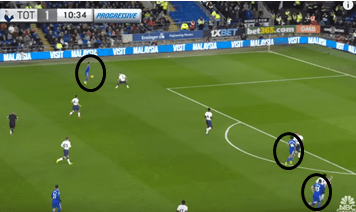
Arguably the greatest influence of this setup’s inability to frustrate the Tottenham attack was the lack of influence of the Cardiff back four. As you will be able to see below Cardiff’s midfield was forced to drop all of the way back to pick up runners. If the defenders simply had these passed off, it would have allowed the Cardiff midfield, Aron Gunnarson in particular, to make more of their presence felt and relieve the constant pressure by Spurs.
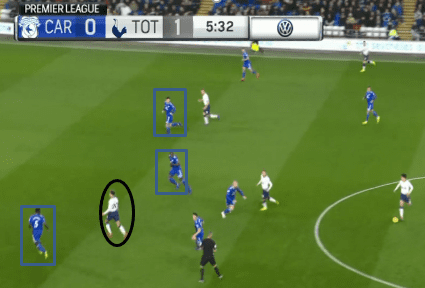
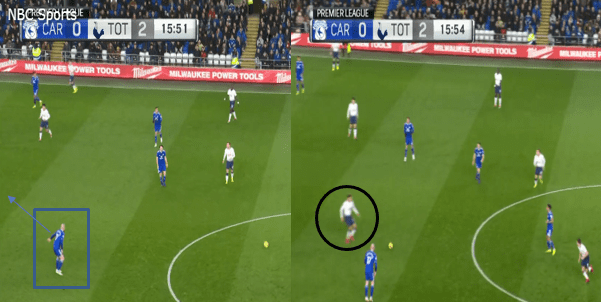
Vintage Kane
The headline may be deceiving due to Kane’s finish most likely not being put up for goal of the year. However, he was absolutely lethal in breaking Cardiff’s low block. His six-second buildup is what one could consider vintage Kane as his off-ball movement created space, turned a defender, switched the point of attack, and finally put himself in a position to finish off the play.

He played a direct part in the build-up of his goal and for Christian Eriksen’s goal, while also recording an assist on Son’s goal. Kane recorded 17 passes in Cardiff’s half. Although forwards are judged by goals scored, he was instrumental in their build-up. His pass for the second goal was able to beat three defenders and essentially Cardiff’s low block altogether.
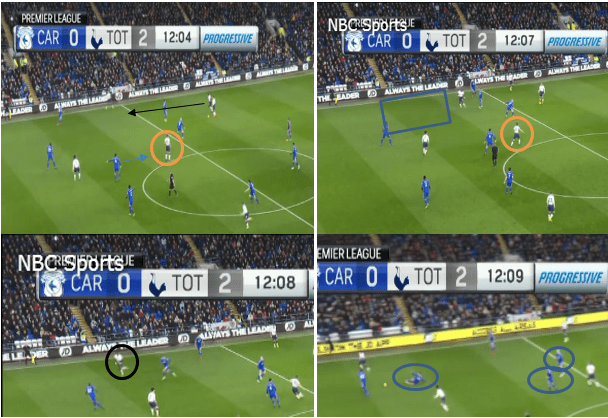
Another aspect of Kane’s impact was his off-ball movement as he was continuously able to find different pockets in the Cardiff defence. As he dropped from the Cardiff back four, he made key attacking dribbles in the opposition half. This was evident especially in the first 25 minutes but also throughout the match.
Spurs’ sensational midfield trio
Pochettino’s set-up called for Harry Winks, Moussa Sissoko, and Christian Eriksen to be tasked with controlling the midfield and breaking down Cardiff City’s low block. They were able to cover a great deal of the pitch while also controlling the ball. Each player had almost 100 touches, just in different fashions.
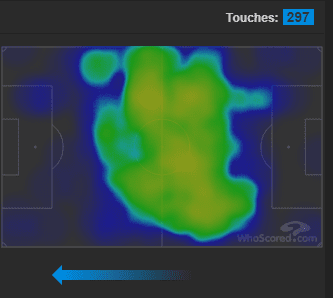
Winks’ role was to relieve pressure on the back four and start buildup play for Spurs. He completed 96 passes, the highest among midfielders for both teams. His ability to start possession and break this initial block allowed for players such as Eriksen, Son and Dele Alli to find space in the Cardiff defence.
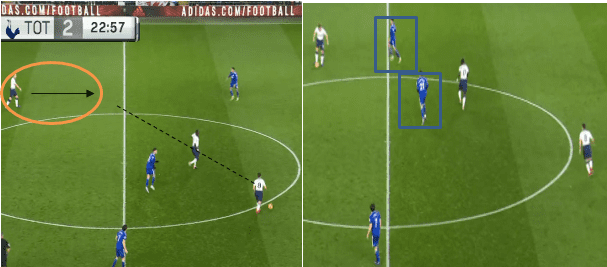
Sissoko was the linking piece for the Spurs central midfield trio. His play allowed Winks to play deep and Eriksen to push forward. He covered massive space while also joining in the attack with a couple of decisive attacking dribbles. In fact he made four in total, one of them a fantastic turn that led to Spurs’ third goal.
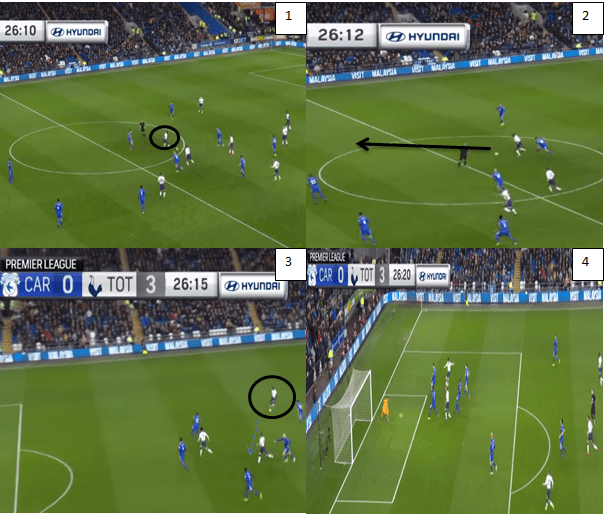
In Pochettino’s setup Eriksen was given the freedom to push inward from the left hand side into the attack. This allowed Alli to push higher up the pitch as well. Eriksen’s ability to link up was on full display as he switched play on numerous occasions and helped break down a very low block. He was also able to join the attack as a late runner which helped set up his goal. As you can see below, these runs forward put constant pressure on the defence.
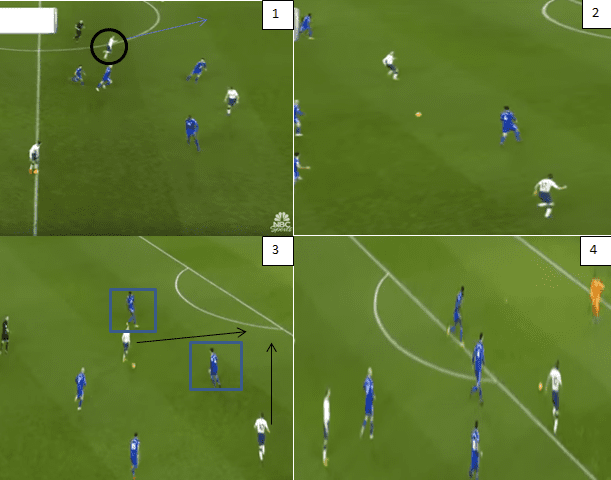
Final Thoughts
With Cardiff City only having 27% of the possession there was not too much Spurs had to be worried about. This game did show Tottenham at their finest however, especially with so many injuries in midfield. They controlled the game early and often defended in the box well, and finished the game with the lead. A couple observations can be made about this uneven match.
Warnock’s setup for Cardiff City was a defensive approach, but many of his players were seemingly lost during the first half. This required a great deal of running but they were not able to interrupt too much of Tottenham’s possession. Cardiff players had to do a great deal of running while only having 440 touches.
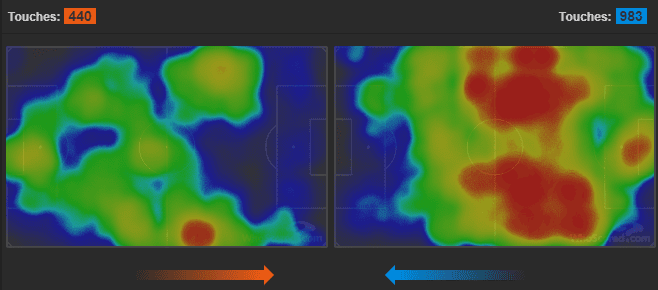
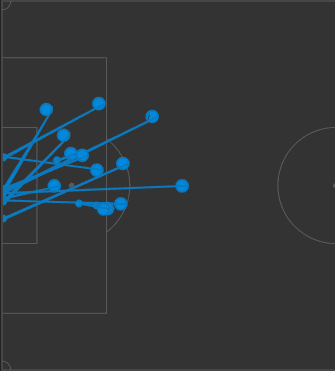
Pochettino’s set-up allowed for his players to breakdown Cardiff’s low block with distinct off-ball movement and combination play. In all three goals the build-up started with breaking down Cardiff’s midfield in different ways: a first-time pass, a decisive turn, or an attacking dribble. All goals were a result of Tottenham’s skilled players breaking down Cardiff using these methods. Spurs were able to register 13 shots, 11 of which were in or around the box.
In short, this was a match that proved that these two teams were in their respective spots in the table for a reason. Tottenham just had too much class for Cardiff to handle in every single facet of the match and Pochetinno’s set-up broke down Warnock’s low block with relative ease.
If you love tactical analysis, then you’ll love the digital magazines from totalfootballanalysis.com – a guaranteed 100+ pages of pure tactical analysis covering topics from the Premier League, Serie A, La Liga, Bundesliga and many, many more. Get your copy of the FIRST of two December issues for just ₤4.99 here, or the SECOND of the December issues with an annual membership right here.





Comments